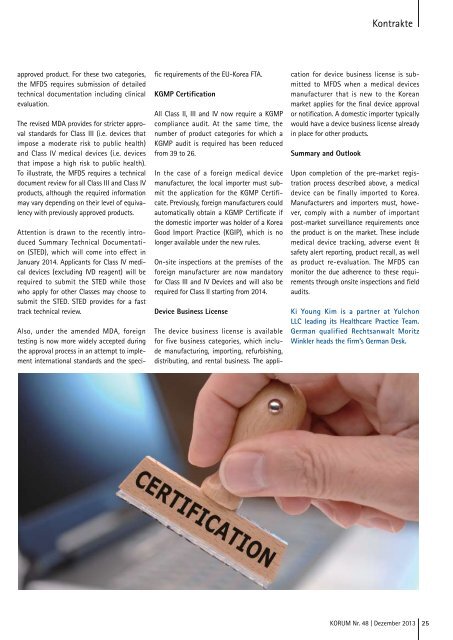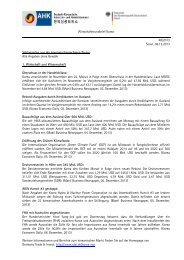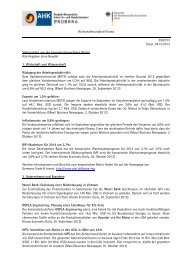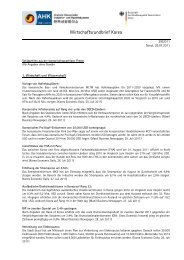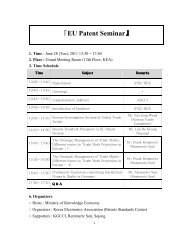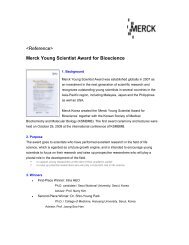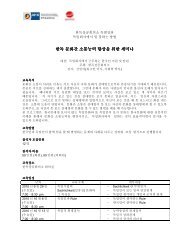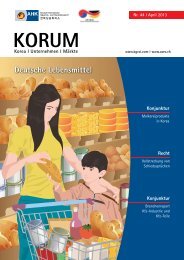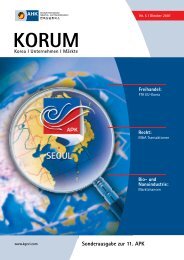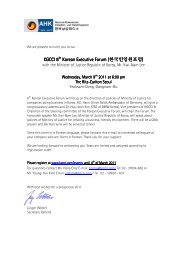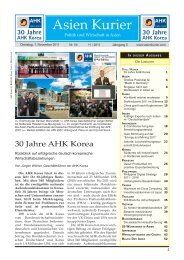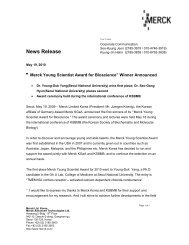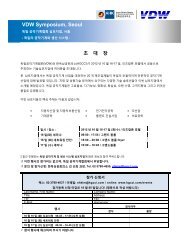Medizintechnik - AHK Korea
Medizintechnik - AHK Korea
Medizintechnik - AHK Korea
Erfolgreiche ePaper selbst erstellen
Machen Sie aus Ihren PDF Publikationen ein blätterbares Flipbook mit unserer einzigartigen Google optimierten e-Paper Software.
Kontrakte<br />
approved product. For these two categories,<br />
the MFDS requires submission of detailed<br />
technical documentation including clinical<br />
evaluation.<br />
The revised MDA provides for stricter approval<br />
standards for Class III (i.e. devices that<br />
impose a moderate risk to public health)<br />
and Class IV medical devices (i.e. devices<br />
that impose a high risk to public health).<br />
To illustrate, the MFDS requires a technical<br />
document review for all Class III and Class IV<br />
products, although the required information<br />
may vary depending on their level of equivalency<br />
with previously approved products.<br />
Attention is drawn to the recently introduced<br />
Summary Technical Documentation<br />
(STED), which will come into effect in<br />
January 2014. Applicants for Class IV medical<br />
devices (excluding IVD reagent) will be<br />
required to submit the STED while those<br />
who apply for other Classes may choose to<br />
submit the STED. STED provides for a fast<br />
track technical review.<br />
Also, under the amended MDA, foreign<br />
testing is now more widely accepted during<br />
the approval process in an attempt to implement<br />
international standards and the speci-<br />
fic requirements of the EU-<strong>Korea</strong> FTA.<br />
KGMP Certification<br />
All Class II, III and IV now require a KGMP<br />
compliance audit. At the same time, the<br />
number of product categories for which a<br />
KGMP audit is required has been reduced<br />
from 39 to 26.<br />
In the case of a foreign medical device<br />
manufacturer, the local importer must submit<br />
the application for the KGMP Certificate.<br />
Previously, foreign manufacturers could<br />
automatically obtain a KGMP Certificate if<br />
the domestic importer was holder of a <strong>Korea</strong><br />
Good Import Practice (KGIP), which is no<br />
longer available under the new rules.<br />
On-site inspections at the premises of the<br />
foreign manufacturer are now mandatory<br />
for Class III and IV Devices and will also be<br />
required for Class II starting from 2014.<br />
Device Business License<br />
The device business license is available<br />
for five business categories, which include<br />
manufacturing, importing, refurbishing,<br />
distributing, and rental business. The application<br />
for device business license is submitted<br />
to MFDS when a medical devices<br />
manufacturer that is new to the <strong>Korea</strong>n<br />
market applies for the final device approval<br />
or notification. A domestic importer typically<br />
would have a device business license already<br />
in place for other products.<br />
Summary and Outlook<br />
Upon completion of the pre-market registration<br />
process described above, a medical<br />
device can be finally imported to <strong>Korea</strong>.<br />
Manufacturers and importers must, however,<br />
comply with a number of important<br />
post-market surveillance requirements once<br />
the product is on the market. These include<br />
medical device tracking, adverse event &<br />
safety alert reporting, product recall, as well<br />
as product re-evaluation. The MFDS can<br />
monitor the due adherence to these requirements<br />
through onsite inspections and field<br />
audits.<br />
Ki Young Kim is a partner at Yulchon<br />
LLC leading its Healthcare Practice Team.<br />
German qualified Rechtsanwalt Moritz<br />
Winkler heads the firm’s German Desk.<br />
KORUM Nr. 48 | Dezember 2013 25


